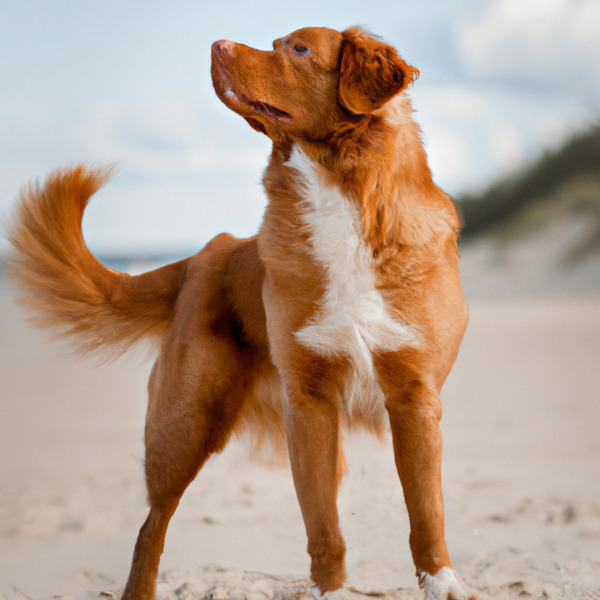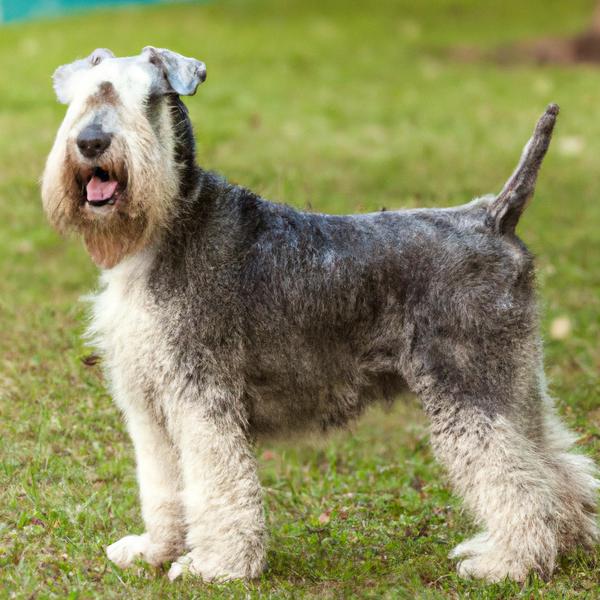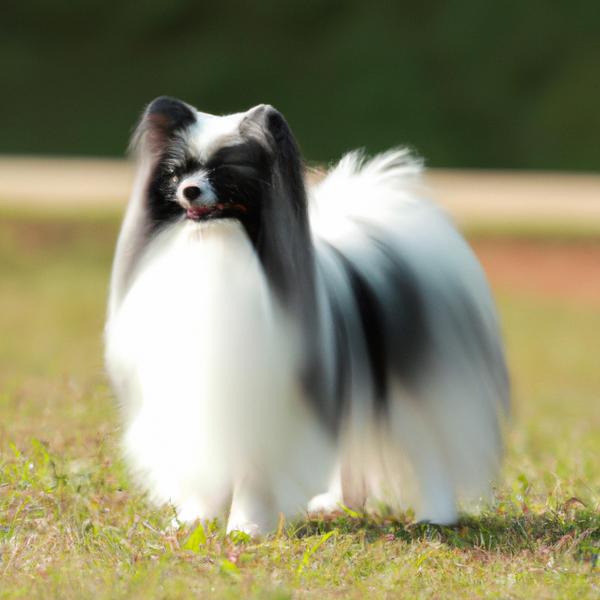
Nova Scotia Duck Tolling Retriever Breed Information & Characteristics
Weight Gain Potential
Do Nova Scotia Duck Tolling Retrievers get fat easily?
The Nova Scotia Duck Tolling Retriever is a breed that has an average to high tendency to gain weight if their weight is not closely monitored. It is important to maintain a balance between exercise and food intake to keep them at a healthy weight. This can be achieved by scheduling at least one daily walk and engaging in regular playtime with them.
Hypoallergenic
Are Nova Scotia Duck Tolling Retrievers Hypoallergenic?
Unfortunately, the Nova Scotia Duck Tolling Retriever is not hypoallergenic, making it not a good choice for a dog lover who suffers from pet allergies.
Temperament
What is a Nova Scotia Duck Tolling Retriever personality? What are Nova Scotia Duck Tolling Retriever dogs best known for?
Affectionate
Courageous
Gentle
Responsive
Alert
Energetic
Playful
Shedding Level
Are Nova Scotia Duck Tolling Retrievers heavy shedders? How Much Does a Nova Scotia Duck Tolling Retriever Shed?
Nova Scotia Duck Tolling Retriever dogs are not heavy shedders, but they will lose a significant amount of hair each year. To decrease the amount of shedding, you can regularly brush your Nova Scotia Duck Tolling Retriever. This will remove loose hair and keep his coat growing in the same direction.
Watchdog Ability
What is the watchdog ability of a Nova Scotia Duck Tolling Retriever dog?
The Nova Scotia Duck Tolling Retriever dogs are average watchdogs. If they sense something different, this breed will alert their owner.
Origin
Where do Nova Scotia Duck Tolling Retrievers come from?
Canada
Ancestry
What are Nova Scotia Duck Tolling Retrievers descended from?
Cocker Spaniels, farm Collies, Irish Setters
Date of Birth
When were Nova Scotia Duck Tolling Retrievers first bred? How old is the Nova Scotia Duck Tolling Retriever breed?
19th Century
Breed Group
What Breed Group is a Nova Scotia Duck Tolling Retriever?
Sporting (AKC:2003)
Gun Dogs (UKC)
Eye Color Possibilites
What color are Nova Scotia Duck Tolling Retriever eyes?
Hazel
Brown
Amber
Nose Color Possibilites
What color can Nova Scotia Duck Tolling Retriever nose be naturally?
Black
Brown
Coat Color Possibilites
What color can Nova Scotia Duck Tolling Retriever coat be naturally?
Red
Coat Length
How long is a Nova Scotia Duck Tolling Retrievers coat?
The coat of a Nova Scotia Duck Tolling Retriever falls in the medium length category.
Coat Density
How Dense Is The Nova Scotia Duck Tolling Retriever Coat?
Coat Texture
What is the texture of the hair of a Nova Scotia Duck Tolling Retriever?
Straight
Litter Size
How many puppies can a Nova Scotia Duck Tolling Retriever have in a litter? How many puppies can a Nova Scotia Duck Tolling Retriever have in her first litter?
A Nova Scotia Duck Tolling Retriever can have a litter of 12-14 puppies on average. However, it's worth noting that the size of the litters can vary greatly. Factors that can influence litter size include the health of the mother, breeding history, and genetics.
Adaptability
Nova Scotia Duck Tolling Retrievers are known for their adaptability and versatility, they are capable of adapting well to a wide range of lifestyle changes and living environments. They are a highly adaptable breed, and make great companions for families and individuals of all lifestyles.
Health Issues
Do Nova Scotia Duck Tolling Retrievers have a lot of health problems?
The Nova Scotia Duck Tolling Retriever breed is commonly healthy with low vet costs, regular check-ups may not be as necessary but it's important to keep an eye on their health and have them checked by a veterinarian when needed.
Major Concerns
What are the major health concerns to be aware of when owning a Nova Scotia Duck Tolling Retriever?
Hip Dysplasia
Progressive Retinal Atrophy (PRA)
Minor Concerns
What are the less significant issues to keep in mind when it comes to Nova Scotia Duck Tolling Retrievers?
Collie Eye Anomaly (CEA)
Occasional Tests
What are the occasional tests recommended for Nova Scotia Duck Tolling Retriever breed?
OFA
CERF
Hearing Tests
Energy
Do Nova Scotia Duck Tolling Retrievers have a lot of energy?
Nova Scotia Duck Tolling Retrievers are high-energy dogs, thus an active lifestyle suits them well.
Social Needs
Do Nova Scotia Duck Tolling Retrievers need socialization? How social are Nova Scotia Duck Tolling Retrievers?
Nova Scotia Duck Tolling Retriever have above average social needs compared to other breeds.They thrive in environments where they have a lot of interaction with humans and other dogs.
Exercise Needed
How much exercise should Nova Scotia Duck Tolling Retrievers get?
The Nova Scotia Duck Tolling Retriever dog needs significant physical activity to maintain a healthy lifestyle. They are also well-suited for those who lead an active lifestyle and enjoy activities such as running, hiking, or other outdoor pursuits.
Sleeping Need
How much sleep should a Nova Scotia Duck Tolling Retriever have? Do Nova Scotia Duck Tolling Retrievers sleep a lot?
Nova Scotia Duck Tolling Retrievers are active dogs that don't require as much sleep as other breeds. However, they still need enough sleep to stay healthy.
Drooling Tendency
Does a Nova Scotia Duck Tolling Retriever drool a lot?
The Nova Scotia Duck Tolling Retriever is a breed of dog that is characterized by its minimal drooling, making it an ideal choice for people who dislike drool marks on their clothing.
Tendency to Bark
How much does it bark?
Nova Scotia Duck Tolling Retrievers tend to bark moderately, they bark when necessary, such as to alert their owner or to communicate something. They may also bark due to certain triggers like fear, alarm, boredom, greeting, separation anxiety and compulsive barking.
Territorial
Do Nova Scotia Duck Tolling Retrievers exhibit aggressive behavior to safeguard their home and territory? Do they possess a natural tendency to guard?
Nova Scotia Duck Tolling Retriever dogs are known for being average at defending. They possess the capability to defend their territory or owners, but it is not their primary trait. They are not the best choice for guard dogs
Mouthiness
Are Nova Scotia Duck Tolling Retrievers mouthy?
Roaming urge
What is the likelihood of a Nova Scotia Duck Tolling Retriever running away? Do they have a tendency to explore or wander frequently?
Prey Drive
Do Nova Scotia Duck Tolling Retriever dogs have a high prey drive?
Past times
What do Nova Scotia Duck Tolling Retrievers enjoy doing? How do I keep my Nova Scotia Duck Tolling Retriever busy?
Fetch, Bike ride, Dog Parks, Walk, Run
Activity Level
What is the energy level of a Nova Scotia Duck Tolling Retriever? How much energy does a Nova Scotia Duck Tolling Retriever have?
Nova Scotia Duck Tolling Retrievers are high-energy dogs. They need mental as well as physical exercise. These dogs require a lot of your involvement and without it they can, and will, become problematic dogs.
Tolerance of being left alone
Walks per Week
How far should a Nova Scotia Duck Tolling Retriever walk each week? How many miles should a Nova Scotia Duck Tolling Retriever walk every week?
There's really no limit to how far you walk your dog as long as they're comfortable. For Nova Scotia Duck Tolling Retriever, it's at least 10 miles / week. Just remember to build distance and stamina gradually over time.
Activity per Day
How much a Nova Scotia Duck Tolling Retriever should exercise a day? How much activity does a Nova Scotia Duck Tolling Retriever need?
In general most Nova Scotia Duck Tolling Retrievers usually need at least 60 minutes of exercise daily. This can be spread across the day and include all sorts of high-energy activities, like walking, running and playing.
Grooming
What level of grooming should be provided for a Nova Scotia Duck Tolling Retriever?
The Nova Scotia Duck Tolling Retriever is a breed of dog that is known for its low grooming needs.
Brushing Frequency
How often should you brush a Nova Scotia Duck Tolling Retriever?
Nova Scotia Duck Tolling Retriever should be brushed at least once a week. Of course you can give them more frequent brushes if you find that they are still shedding a lot
Brushing Tools
What are the most commonly used brushing tools for Nova Scotia Duck Tolling Retrievers?
Pin Brush
Dematter
Comb
Nail Clipper
Cups
How many cups of food does a Nova Scotia Duck Tolling Retriever eat?
For an average 44-51 pound (20 - 23 kg) Nova Scotia Duck Tolling Retriever feed 2.3 cups daily. But, keep in mind, the amount you feed is going to be dependent on the quality of the food you are feeding.
Daily Cost
How Much Does a Nova Scotia Duck Tolling Retriever Cost Daily?
The average cost of a Nova Scotia Duck Tolling Retriever is somewhere $1.70 - $2.00 per day.
Monthly Cost
How Much Does a Nova Scotia Duck Tolling Retriever Cost Per Month?
The average per month expenses of a Nova Scotia Duck Tolling Retriever is between $48 - $63. This makes an average of $576 - $756 per year. It will be on the higher side when the dog is still small because it will need more frequent visits to the vet, shots.
Intelligence
How intelligent is a Nova Scotia Duck Tolling Retriever?
The Nova Scotia Duck Tolling Retriever have below the average degree of obedience intelligence among other breeds. However, calling them “dumb dogs” is unfair. Where Nova Scotia Duck Tolling Retrievers lack in obedience & working intelligence, they make up for it with their keen ability to understand human emotions.
Sensitivity Level
How sensitive is a Nova Scotia Duck Tolling Retriever dog?
Nova Scotia Duck Tolling Retriever dogs have average emotions and are adaptable to different situations, not requiring extra care like sensitive breeds do.
Affection Dependance
Are Nova Scotia Duck Tolling Retriever dogs affectionate?
Apartment Friendly
Do Nova Scotia Duck Tolling Retriever do well in apartments? Are Nova Scotia Duck Tolling Retrievers good indoor dogs?
Nova Scotia Duck Tolling Retrievers are dogs that do well in apartments with sufficient exercise, but they would really appreciate a small yard.
Child Friendly
Are Nova Scotia Duck Tolling Retrievers good with kids? Are Nova Scotia Duck Tolling Retrievers good around children?
A Nova Scotia Duck Tolling Retrievers typical characteristics indicate that this breed of dog is an ideal companion for kids and makes them family pets. Their gentle and protective nature and calm mentality make them gel along quickly with the younger humans
Senior-friendly
Are Nova Scotia Duck Tolling Retrievers good for elderly?
Cat Friendly
Are Nova Scotia Duck Tolling Retrievers good with cats? How friendly Nova Scotia Duck Tolling Retrievers are toward cats?
Nova Scotia Duck Tolling Retrievers are an average cat friendly dog. They do well with cats, even more if raised together from puppyhood,
Dog Friendly
Do Nova Scotia Duck Tolling Retriever dogs get along with other dogs? Are Nova Scotia Duck Tolling Retrievers OK with other dogs?
Nova Scotia Duck Tolling Retrievers are very friendly towards other dogs. This breed typically have a happy and affectionate temperament around dogs.
Pet friendly
How do Nova Scotia Duck Tolling Retriever dogs interact with other pets? Are they considered pet-friendly?
Stranger Friendly
Are Nova Scotia Duck Tolling Retrievers friendly with strangers?
Nova Scotia Duck Tolling Retrievers are below average friendly around strangers. Keen of eye and sharp of tongue, most Nova Scotia Duck Tolling Retrievers are very quick to announce strangers at the door. Once the visitor comes in, some Nova Scotia Duck Tolling Retrievers will be friendly and outgoing. But many others have the standoffish or suspicious towards strangers.
Playfulness
Do Nova Scotia Duck Tolling Retrievers like to play? Are Nova Scotia Duck Tolling Retrievers playful?
Nova Scotia Duck Tolling Retrievers are known to be highly playful dog. So if you're not up for all that, think about adopting a slightly older Nova Scotia Duck Tolling Retriever for a mellower experience.
Trainability
Are Nova Scotia Duck Tolling Retriever easily trained?
Nova Scotia Duck Tolling Retriever dogs are known for their ease of training and ability to learn quickly, making them a popular choice for pet owners and trainers alike.
Compare Nova Scotia Duck Tolling Retriever with other breeds

Doberman Greyhound
Nova Scotia Duck Tolling Retriever vs Doberman Greyhound

Euro Mountain Sheparnese
Nova Scotia Duck Tolling Retriever vs Euro Mountain Sheparnese

Sealyham Terrier
Nova Scotia Duck Tolling Retriever vs Sealyham Terrier

Border Malamute Terrier
Nova Scotia Duck Tolling Retriever vs Border Malamute Terrier

Smooth Fox Beagle
Nova Scotia Duck Tolling Retriever vs Smooth Fox Beagle

Pomeagle
Nova Scotia Duck Tolling Retriever vs Pomeagle

Siberian Boston
Nova Scotia Duck Tolling Retriever vs Siberian Boston

Shiffon
Nova Scotia Duck Tolling Retriever vs Shiffon

Pinweiler
Nova Scotia Duck Tolling Retriever vs Pinweiler

Auss-Tzu
Nova Scotia Duck Tolling Retriever vs Auss-Tzu

Bostie
Nova Scotia Duck Tolling Retriever vs Bostie

Scottish Staffish Bull Terrier
Nova Scotia Duck Tolling Retriever vs Scottish Staffish Bull Terrier